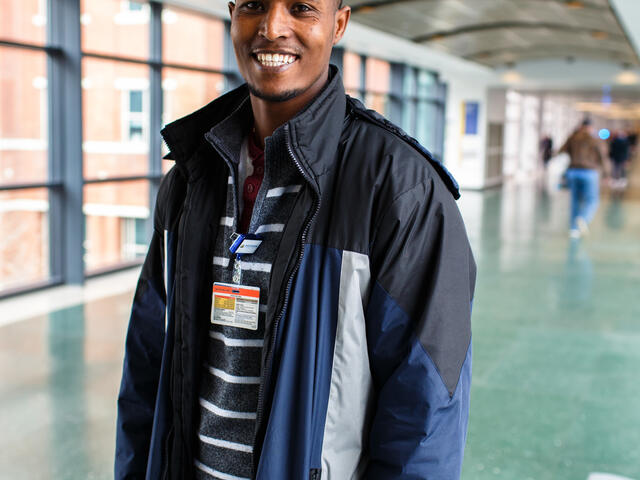
The new administration in the White House has suspended the refugee resettlement program, which will impact thousands of innocent people—mostly women and children—fleeing war and persecution and awaiting resettlement in the United States. Here’s what some resettled refugees want President Trump to know:
Refugees love America's values.

Name: Shadi Hassan Ismail
Age: 30
From: Latakia, Syria
Arrived in: Boise, Idaho
Reason for fleeing: Openly gay, his father and brother threatened to kill him
Occupation: Manager at a food products supplier
"America is all about love. That's something we can't throw away. The love I saw here as a gay, Syrian refugee, I never felt before. America has always been successful at accepting people for who they are, not where they are from. I understand people are scared, but it took me almost five years to be allowed to come to America. The security process is so excruciating, you feel you may never be accepted."
Refugees work hard.
Name: Yisehak Samage
Age: 40
From: Ethiopia
Arrived in: Baltimore, Maryland
Reason for fleeing: Government persecution of his family
Occupation: Works various jobs while enrolled in nursing classes
“Refugees are ready to work hard. I came knowing no one, without my family. It was very frustrating. But I never hesitate to improve my language or work small jobs. I used to be a biology teacher, but here I worked cleaning jobs and at a gas station. I now bought a house and am proud of myself.”
Refugees deserve a chance at a better life.

Name: Elizabeth Fofana
Age: 20
From: Lofa, Liberia
Arrived in: Baltimore
Reason for fleeing: Liberia's civil war
Aspirations: Fashion designer
“I belong here because I deserve a chance at life. I deserve a chance at a better life, just like Americans. People don’t understand why [refugees] come here. They come here to have a life of their own, peacefully. I’m saddened that people who are fleeing from such violence will not get an opportunity to come to this country like I did.”
Refugees come here for their children.

Name: Naima Samatar (her son Muhammed, above)
Age: 28
From: Somalia
Arrived in: Baltimore
Reason for fleeing: Conflict in Somalia
Occupation: Laundry worker at a hospital
“I came here for my son, Muhammed. I want him to go to school, grow up and be a good person. He’s doing so well in school, learning English. Refugees are hard workers. I also want to say, I’m waiting to be reunited with my husband who is still in Somalia. Muhammed misses him very much.”
Refugees are exhaustively vetted.

Name: Linda J.
From: Damascus, Syria
Arrived in: Baltimore
Reason for fleeing: Shelling attack that killed her newborn son
"We, too, have been appalled by the Islamic State’s terrorist attacks around the world, and we condemn them wholeheartedly. My family and I lived through horrific acts like these. I believe the screening we underwent was so intense, so thorough and so long that it would be impossible for militants to come here."
Refugees are not dangerous.
Name: Salam Bunyan
Age: 42
From: Baghdad, Iraq
Arrived in: Boise
Reason for fleeing: Threatened by insurgents who killed his brother
Occupation: Owner and head chef of The Goodness Land Restaurant
“Don’t think just because [some refugees] are Muslim, they're supposed to be dangerous. There’s a great mix inside America. All are human and all have the same rights. I'm Muslim, I'm an American citizen and I have a good relationship with the community. When you hear a [refugee’s] story, it means nothing until you live it. I had a good job, a big house, a big family and money in Iraq. But I left to save my kids. We are all trying to survive. When you lose your family, your country, your life, coming to America is a new chance.”
Refugees are not terrorists.

Name: Jamal Jbawi (center)
Age: 39
From: Daraa, Syria
Arrived in: Baltimore
Reason for fleeing: Bombing during Syria's civil war
Occupation: Inspector at a manufacturing company
“We want to assure you that we came here to live in peace and we are not terrorists. The only thing we came to America for is to build a future for our children. We would be forever grateful if you would help us do that.”
Let's have an honest conversation about this.

Name: Patrick Muteba (second from left)
Age: 21
From: Zambia
Arrived in: Boise
Reason for fleeing: No real future for his family, Congolese refugees
Occupation: Student at University of Idaho
“You're an American; I'm a refugee. Let's have an honest conversation about this. The small minority of people doing bad things does not represent the refugee community and what we stand for. It's about taking the opportunities, education being the most important.”
I belong here.

Name: Mulu Bahre
Age: 24
From: Eritrea
Arrived in: Baltimore
Reason for fleeing: Government persecution of his family
Occupation: Anesthesia critical-care technician at John Hopkins Hospital
“It was a big change for me, it was also big commitment. I felt like, am I really doing this, I'm going to be an American. And the day I went to be sworn in [as a U.S. citizen], that was a full joy for me. I was really excited and knew that there were more opportunities ahead of me. It made me feel like I belong here.”
*Names changed for privacy reasons
Learn more
About refugees and resettlement
Why is the president banning refugees?
Get involved
How to help refugees in the U.S.
The International Rescue Committee responds to the world’s worst humanitarian crises, helping to restore health, safety, education, economic wellbeing, and power to people devastated by conflict and disaster. Founded in 1933 at the call of Albert Einstein, the IRC is at work in over 40 countries and 29 U.S. cities helping people to survive, reclaim control of their future and strengthen their communities.